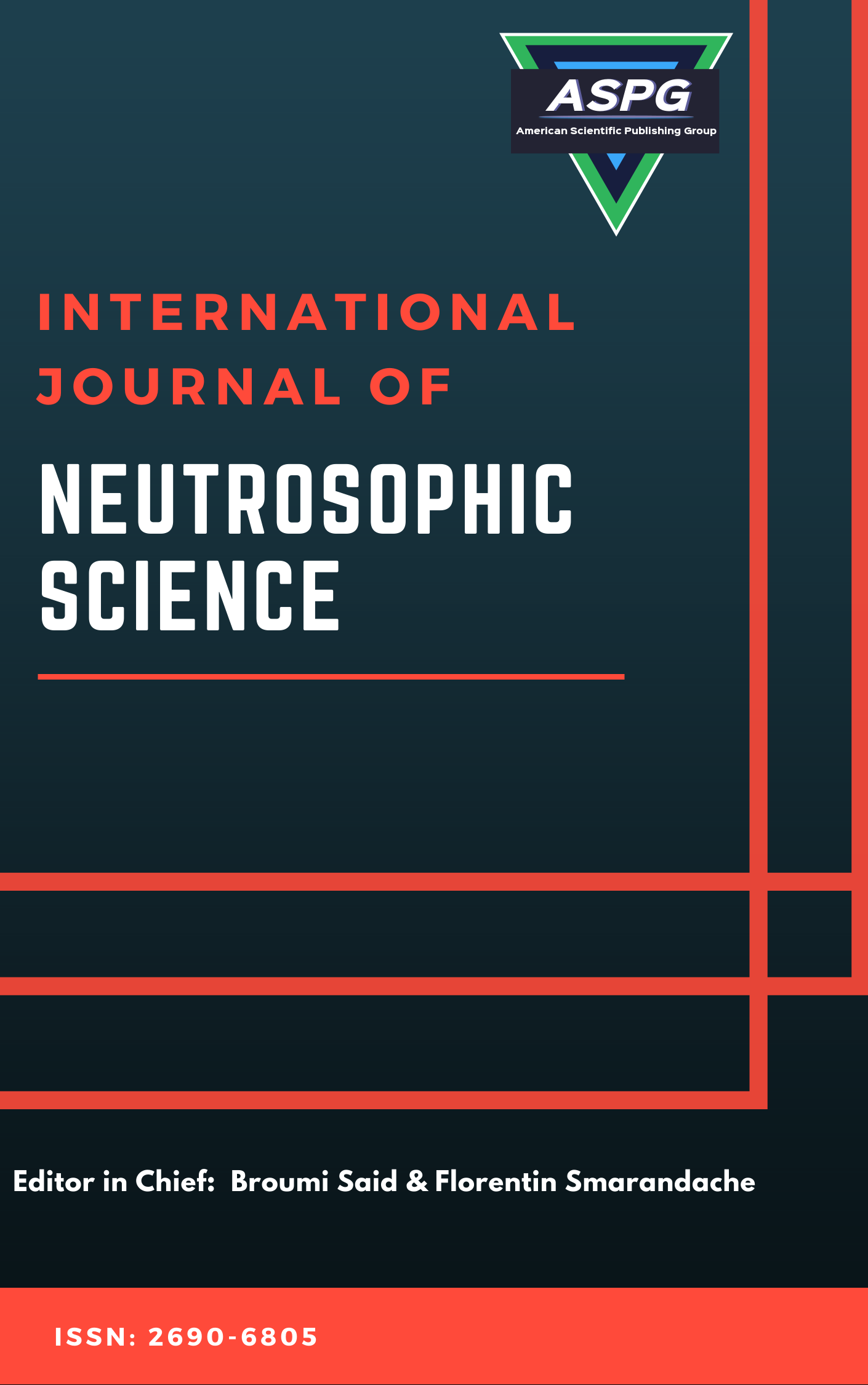

Volume 19 , Issue 4 , PP: 37-48, 2022 | Cite this article as | XML | Html | PDF | Full Length Article
M. Palanikumar 1 * , Aiyared Iampan 2
Doi: https://doi.org/10.54216/IJNS.190403
We introduce the notion of Diophantine neutrosophic subbisemiring (DioNSBS), level sets of DioNSBS of a bisemiring. The concept of DioNSBS is a generalization of fuzzy subbisemiring over bisemiring. We interact the theory for (λ, μ)-DioNSBS over bisemiring. Let α be the Diophantine neutrosophic subset in S , we show that α = ⟨(ΞT α , ΞI α , ΞF α ), (Γα, ∆α, Θα)⟩ is a DioNSBS of S if and only if all non empty level set α(t,s) is a subbisemiring of S for t, s ∈ [0, 1]. Let α be the DioNSBS of a bisemiring S and W be the strongest Diophantine neutrosophic relation of S , we observe that α is a DioNSBS of S if and only if W is a DioNSBS of S × S . Let α1, α2, ..., αn be the family of DioN SBSs of S1, S2, ..., Sn respectively. We show that α1× α2 × ... × αn is a DioNSBS of S1 × S2 × ... × Sn. The homomorphic image of DioNSBS is a DioNSBS. The homomorphic preimage of DioNSBS is a DioNSBS. Examples are provided to illustrate our results.
fuzzy subbisemiring , neutrosophic subbisemiring , Diophantine neutrosophic bisemiring , (&lambda , , &mu , )-
Diophantine neutrosophic subbisemiring , homomorphism
[1] J. Ahsan, K. Saifullah, F. Khan, Fuzzy semirings, Fuzzy Sets and Systems, vol. 60, pp. 309–320, 1993.
[2] K. Arulmozhi, The algebraic theory of semigroups and semirings, Lap Lambert Academic Publishing,
Mauritius, 2019.
[3] K. Atanassov, Intuitionistic fuzzy sets, Fuzzy Sets and Systems, vol. 20, no. 1, pp. 87–96, 1986.
[4] F. Hussian, R. M. Hashism, A. Khan, M. Naeem, Generalization of bisemirings, International Journal of
Computer Science and Information Security, vol. 14, no. 9, pp. 275–289, 2016.
[5] S. J. Golan, Semirings and their applications, Kluwer Academic Publishers, London, 1999.
[6] K. Is´eki, Ideal theory of semiring, Proceedings of the Japan Academy, vol. 32, pp. 554–559, 1956.
[7] K. Is´eki, Ideals in semirings, Proceedings of the Japan Academy, vol. 34, no. 1, pp. 29–31, 1958.
[8] K. Is´eki, Quasi-ideals in semirings without zero, Proceedings of the Japan Academy, vol. 34, no. 2, pp.
79–81, 1958.
[9] M. Palanikumar, K. Arulmozhi, On vague subbisemirings of bisemirings, Bulletin of the International
Mathematical Virtual Institute, vol. 11, no. 3, pp. 419–428, 2022.
[10] M. Palanikumar, A. Iampan, Spherical Fermatean interval valued fuzzy soft set based on multi criteria
group decision making, International Journal of Innovative Computing, Information and Control, vol. 18,
no. 2, pp. 607–619, 2022.
[11] M. Palanikumar, A. Iampan, Novel approach to decision making based on type-II generalized Fermatean
bipolar fuzzy soft sets, International Journal of Innovative Computing, Information and Control, vol. 18,
no. 3, pp. 769–781, 2022.
[12] M. Palanikumar, A. Iampan, L. J. Manavalan, M-Bi-base generator of ordered gamma-semigroups, ICIC
Express Letters, Part B: Applications, vol. 13, no. 8, pp. 795–802, 2022.
[13] M. Palanikumar, K. Arulmozhi, (α, β)-Neutrosophic subbisemiring of bisemiring, Neutrosophic Sets
and Systems, vol. 48, pp. 368–385, 2022.
[14] M. Palanikumar, K. Arulmozhi, On new ways of various ideals in ternary semigroups, Matrix Science
Mathematic, vol. 4, no. 1, pp. 6–9, 2020.
[15] M. Palanikumar, K. Arulmozhi, On various tri-ideals in ternary semirings, Bulletin of the International
Mathematical Virtual Institute, vol. 11, no. 1, pp. 79–90, 2021.
[16] M. Palanikumar, K. Arulmozhi, On intuitionistic fuzzy normal subbisemiring of bisemiring, Nonlinear
Studies, vol. 28, no. 3, pp. 717–721, 2021.
[17] M. Palanikumar, K. Arulmozhi, C. Jana, Multiple attribute decision-making approach for Pythagorean
neutrosophic normal interval-valued aggregation operators, Computational and Applied Mathematics,
vol. 41, Article number: 90, 2022.
[18] M. Riaz, M. R. Hashmi, Linear Diophantine fuzzy set and its applications towards multi attribute decision
making problems, Journal of Intelligent and Fuzzy Systems, vol. 37, no. 4, pp. 5417–5439, 2019.
[19] M. K. Sen, S. Ghosh, An introduction to bisemirings, Southeast Asian Bulletin of Mathematics, vol. 28,
no. 3, pp. 547–559, 2001.
[20] F. Smarandache, A unifying field in logics. Neutrosophy: neutrosophic probability, set and logic, American
Research Press, Rehoboth, 1999.
[21] H. S. Vandiver, Note on a simple type of algebra in which the cancellation law of addition does not hold,
Bulletin of the American Mathematical Society, vol. 40, no. 12, pp. 914–920, 1934.
[22] L. A. Zadeh, Fuzzy sets, Information and Control, vol. 8, no. 3, pp. 338–353, 1965.